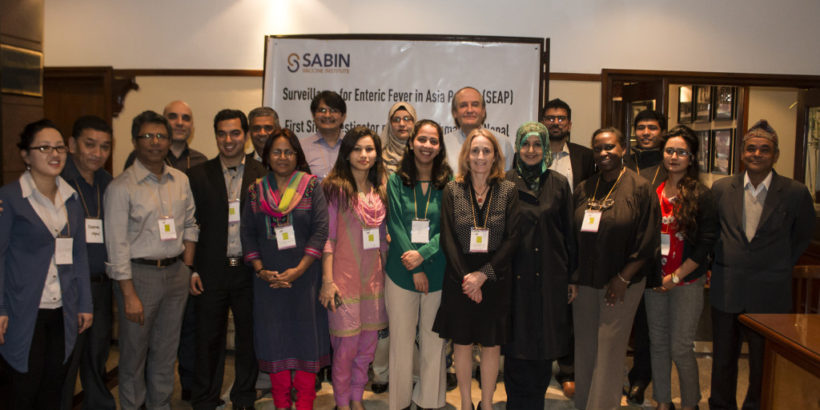The first site investigator meeting of the Surveillance for Enteric Fever in Asia Project (SEAP) took place February 25 – February 28 in Kathmandu, Nepal.
SEAP is a new initiative by the Sabin Vaccine Institute to establish a hospital based enteric fever surveillance network in Asia. The network will enable the systematic collection of data in order to fill knowledge gaps on the impact of severe enteric fever, including: incidence, mortality, complications (intestinal perforation, etc.), hospitalization rates, household economic impact, and clinical outcome differences between drug-sensitive and drug-resistant Salmonella Typhi (S. Typhi) and Salmonella Paratyphi (S. Paratyphi). The proposed project will include a surveillance network in Bangladesh, India, Indonesia, Nepal, and Pakistan, and will be carried out in two phases over a period of three years.
Site investigators and consultants met in Kathmandu to discuss Phase I of the project. Phase I will begin with a healthcare facility assessment of selected study sites to assess what resources are required for a systematic collection of enteric fever data. Investigators will then begin a retrospective study of existing hospital records at the study sites.
One of the major challenges with enteric fever surveillance is that treatment typically occurs outside of tertiary healthcare facilities. Febrile patients often visit community health care providers that do not conduct diagnostic evaluation and prescribe first-line antibiotics with or without the presence of a positive blood culture. Thus, typhoid cases are vastly under reported. To combat this issue, Phase I of SEAP will include a healthcare utilization survey, which can later be used to adjust disease burden estimates to the population level.
To help ensure support from key stakeholders at the national and local level, Phase I will also include the formation of site-specific stakeholder committees, which will include representatives from all relevant governmental and non-governmental sectors.
Phase I will conclude with analysis of all data collected. This will inform design of Phase 2, a prospective surveillance study.
Project activities are expected to begin immediately.



